1.Small Cap Stocks -25%
Small Cap stocks back to 2019 lows….Never made new highs on charts.
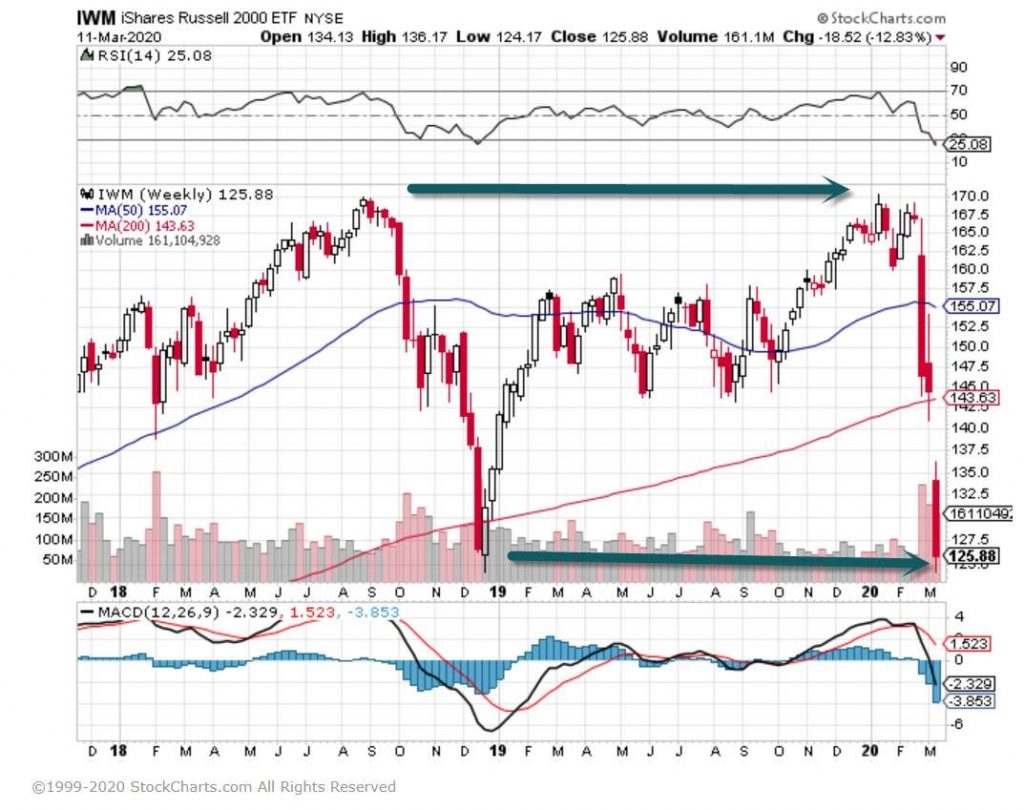

2.Dow Transports Break Thru 2019 Lows…-30%
Transports never made new highs…
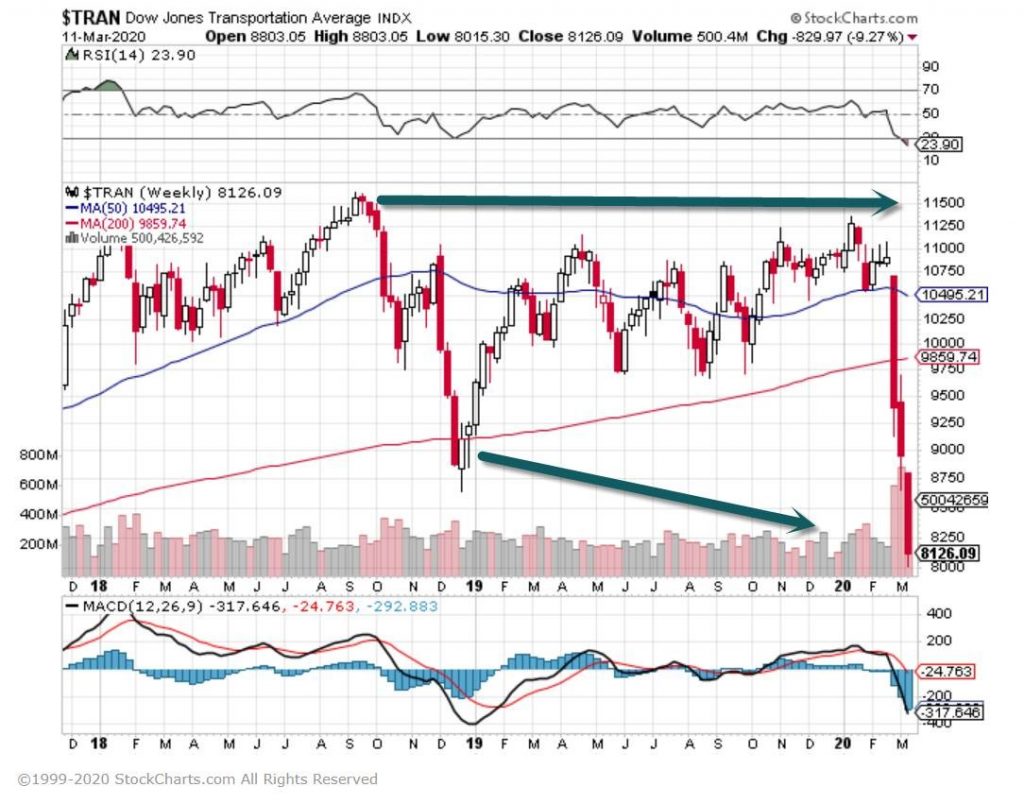
3.Micro-Cap Stocks -30%…Break 2019 Lows.
Micro Cap ETF
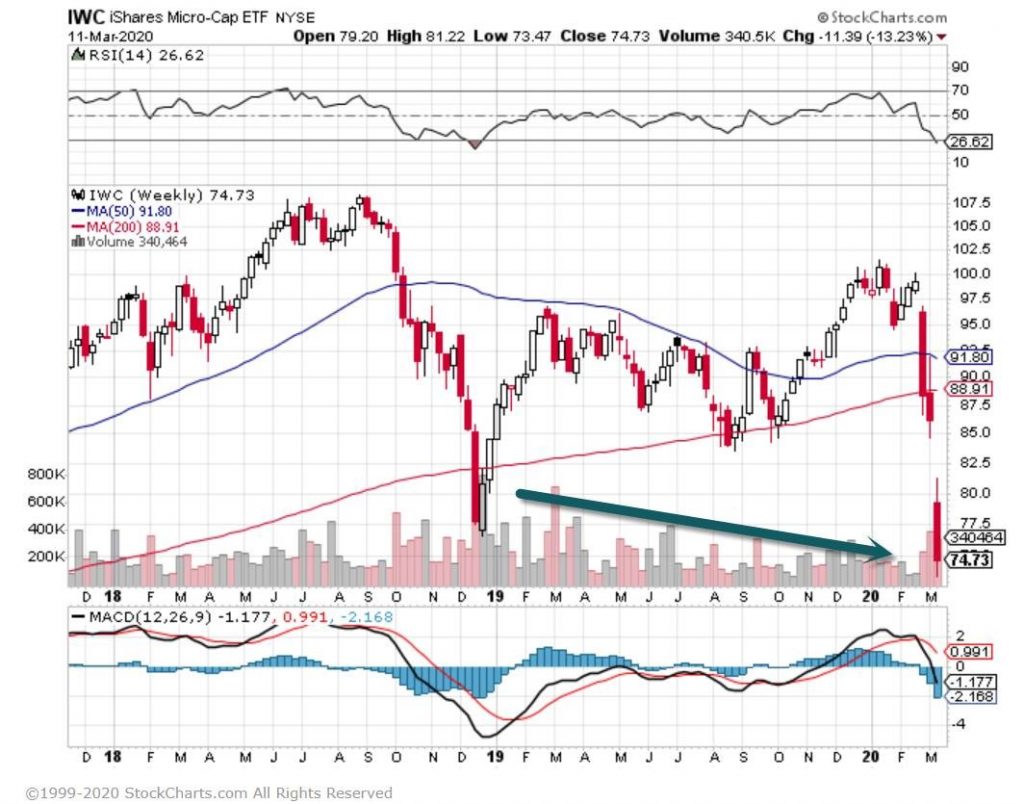
4.High-Yield Spread Widening Out.
High-yield spreads hit 600bps.

https://blogs.wsj.com/dailyshot/2020/03/12/the-daily-shot-capitulation-in-the-credit-markets/
HYG-Junk Bond ETF -10%
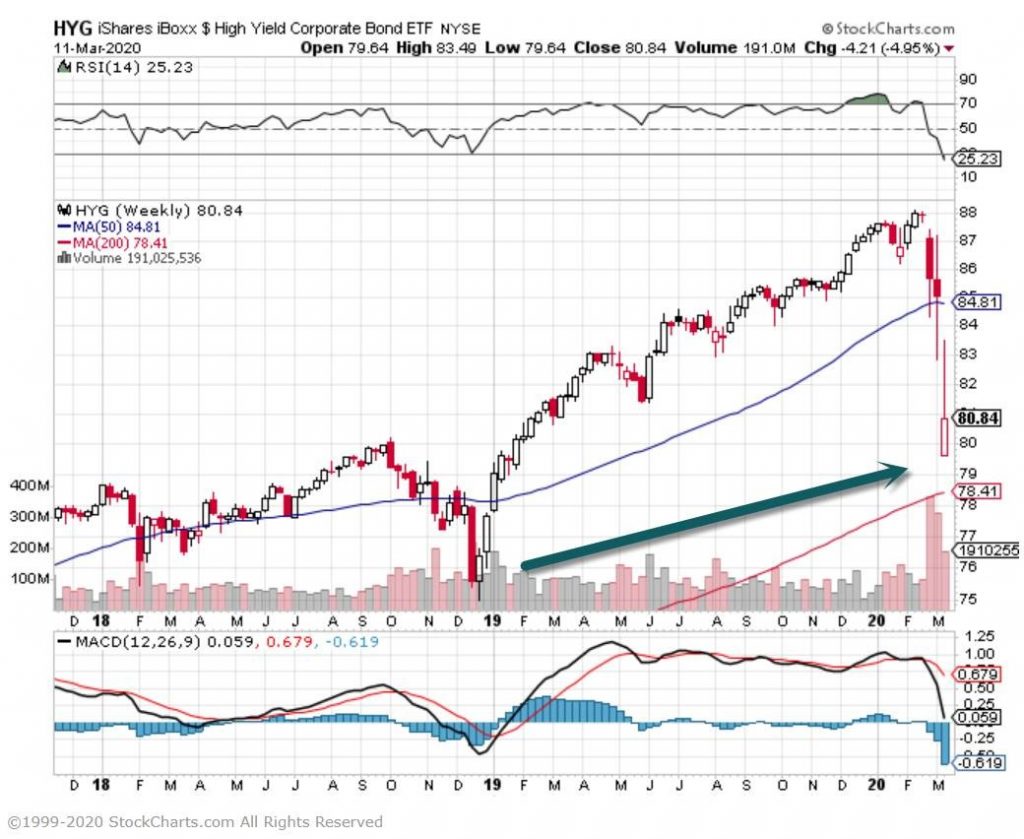
5.Emerging Markets Down Less Than S&P YTD.
EEM emerging markets down 1% less than S&P….EFA Europe down the most and more coming today.
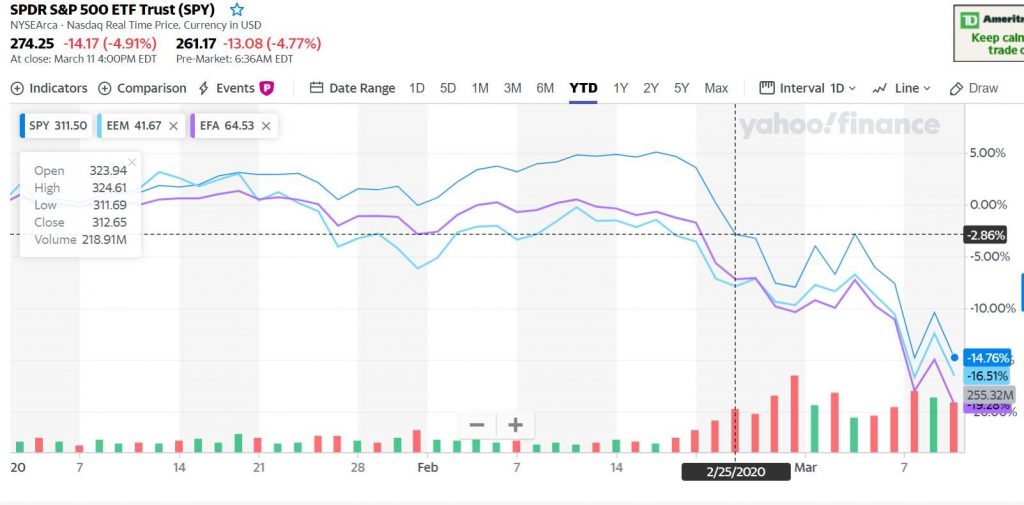
6.Government Bond Yields.
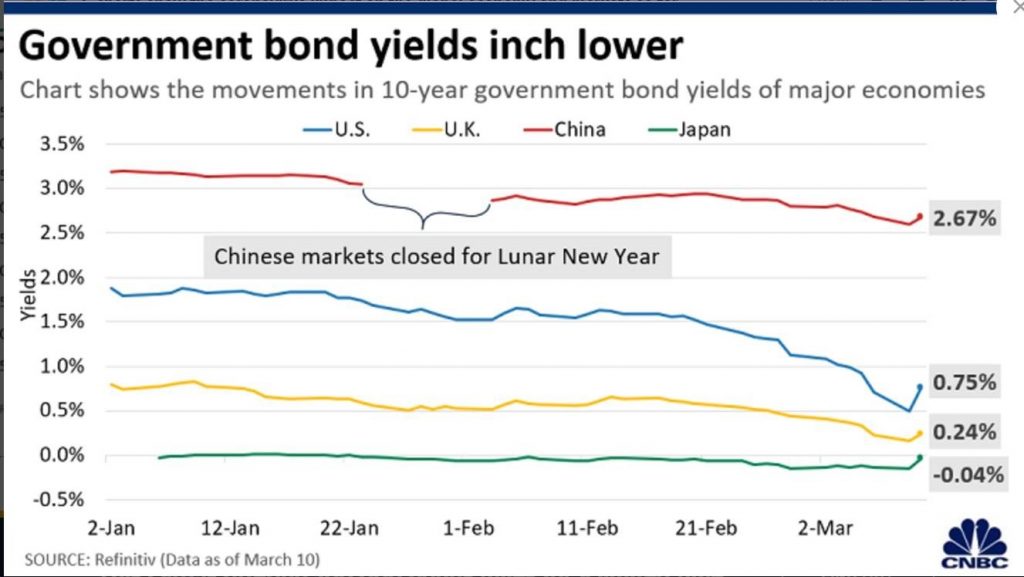
6 charts show the coronavirus impact on the global economy and markets so far
7.One Chart on Slowing The Spread of Infection.
NY Times-Flattening the Coronavirus Curve
One chart explains why slowing the spread of the infection is nearly as important as stopping it.

Mitigation efforts like social distancing help reduce the disease caseload on any given date, and can keep the healthcare system from becoming overwhelmed.Credit…Drew Harris
Found at Abnormal Returns www.abnormalreturns.com
8.NCAA Men’s Basketball Generates Close to $1B Per Year…
NCAA’s March Madness coronavirus plan will cost organization big
Ticket revenue will certainly plunge after NCAA President Mark Emmert announced plans to limit attendance
The NCAA’s lucrative March Madness basketball tournaments will proceed this month without fans in attendance due to concerns related to the coronavirus outbreak, jeopardizing expected revenue from the multibillion-dollar event.
The NCAA’s Division I men’s basketball tournament generates $867.5 million annually from television and marketing rights alone, according to the institution’s website. The event composes a significant portion of the NCAA’s yearly revenue. In 2019, the NCAA earned an estimated $933 million when factoring in media rights, ticket sales and sponsorships.
Ticket revenue will certainly plunge after NCAA President Mark Emmert announced plans to limit attendance at the men’s and women’s basketball tournaments. Only school officials, essential staff and players’ family members will be permitted to attend.
9.Dow Averaging 300 Point Swings in Last 30 mins of Trading
The Dow has swung an average of about 300 points in the last 30 minutes of trading over the past 10 sessions—including Tuesday’s dramatic rally of roughly 400 points to end the day. That is roughly triple the average swing recorded between 12:30 p.m. and 1 p.m., when activity hovers near its lows of the day, for the same period.
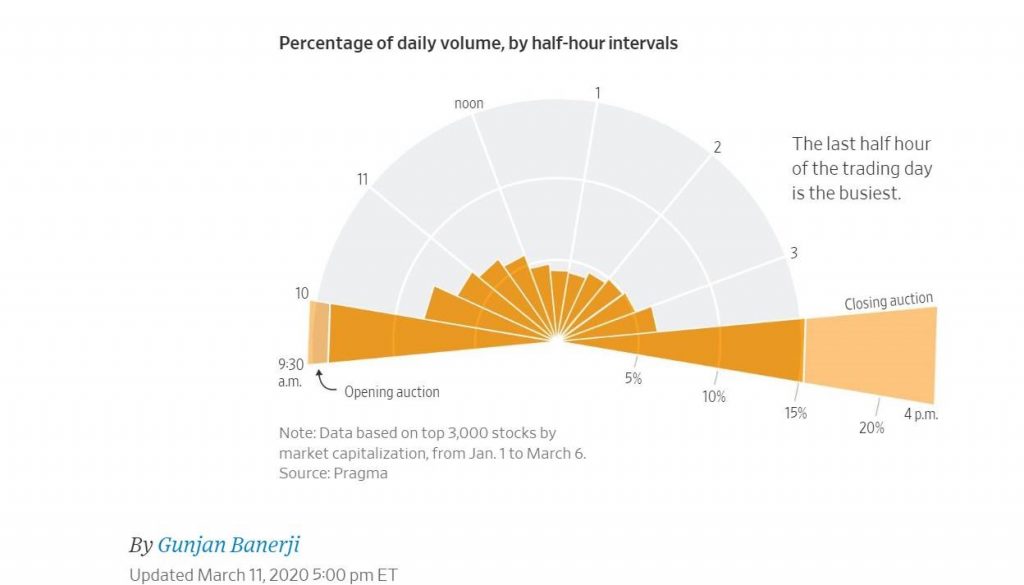
10.5 Stoic Lessons On Time Management
American jazz icon Miles Davis once said, “Time isn’t the main thing, it’s the only thing.” Seneca once wrote that it’s not that we have a short time to live, but that we waste a great deal of it. We all envelop ourselves in various forms of escapism, hoping either to postpone our responsibilities or avoid them altogether. As addicting as it is, desire is the enemy to proper time management. Poor sleeping habits, unhealthy lifestyle choices, and just plain dissatisfaction are all byproducts of a poorly managed life. Epictetus spoke of this too in the Enchiridion, writing “If you are careless and lazy now and keep putting things off and always deferring the day after which you will attend to yourself, you will not notice that you are making no progress, but you will live and die as someone quite ordinary”
Yes, time management is extremely difficult. It’s a never-ending process of elimination, constantly refining what works for us and what doesn’t. Luckily, Stoic philosophers like Marcus Aurelius, Seneca and Epictetus all had valuable insight on how we can manage our time more effectively. Here are 5 tips on how to manage your time like a Stoic.
Replace Procrastination With Delayed Gratification
“Putting things off is the greatest waste of life: it snatches away each day as it comes, and denies us the present by promising the future.”
— Seneca, On The Shortness Of Life
How often do we mutter to ourselves, “I’ll do it later” or “Eh, I don’t feel like doing that”. It feels good in the moment—sure. But the indulgence of impulsive desire has never been consistent with the teachings of Stoicism.
It’s obvious to us that the Stoics were men of action. Marcus Aurelius, the Roman Emperor and talented philosopher still found time to write in his journal during the midst of military campaigns and political turmoil. Epictetus too, despite being born into slavery and suffering from a debilitating leg injury, managed to open numerous philosophy schools and build a legendary reputation for himself. When we procrastinate, we are neither completing the tasks that were assigned to us, nor are we spending our time fruitfully. Not to mention, we also aren’t present. We’re living somewhere in our heads where we physically are not.
Rather than allowing ourselves to put off the important stuff, we can always break our work down into short bursts of energetic action. An example, every thirty minutes of diligent work could be rewarded with five minutes of phone time. This allows us to momentarily engage in those activities we enjoy, but also utilize them as positive reinforcers for productive behavior. We have to resist those impulses to watch TV for hours, to play video games all night long, and to waste time in general. If we can learn to delay the gratification that comes with impulsivity and complete our tasks in a timely manner, we are making far better use of our time. The Stoics knew better than anyone—there is no time to waste.
Take Your Time On Things That Matter
“Nothing great is created suddenly, any more than a bunch of grapes or a fig. If you tell me that you desire a fig, I answer you that there must be time. Let it first blossom, then bear fruit, then ripen”
— Epictetus, Discourses
Sometimes we’re forced to rush things. Maybe our boss is putting pressure on us to meet certain deadlines, or maybe it’s our own internal pressure; our own internal deadlines. We live in a fast-paced world where everything is an emergency. But if we truly wish to improve our time management skills, it’s more important that we slow down and be still.
In Stillness is the Key, Ryan Holiday shares the story of the legendary archery master Awa Kenzo. Kenzo famously never taught students how to deliberately aim and shoot at a target. Mastery of the bow only came from mastery of detachment. “The hits on the target,” Kenzo said, “are only the outward proof and confirmation of your purposelessness at its highest, of your egolessness, your self-abandonment, or whatever you like to call this state”. Time management is a lot like archery in this sense. In order to hit our target (or deadlines) we have to mentally detach from our urge to rush through things and turn them around quickly. We have to see our work with an objectively clear mind. Easier said than done, certainly. But it can be done.
We ought to keep in mind that slowing down is consistent with our guiding doctrine of living according to nature. Nature demands that certain processes take extended periods of time. Like the growth of a redwood tree, or as Epictetus pointed out, the blossoming of a fig. When we feel like we need to rush, it’s already too late—we have failed to properly manage our time around that task. Rushing is sometimes inevitable of course, but we’d be ignorant to not take Epictetus’ advice and slow it down on the important things. Quality work takes time. This is the way it has always been. But we can manage our time more effectively by focusing on the things that matter and moving faster through the things that don’t. Simple as that.
Pausing is Important
“We must go for walks out of doors, so that the mind can be strengthened and invigorated by a clear sky and plenty of fresh air. At times it will acquire fresh energy from a journey by carriage and a change of scene, or from socializing and drinking freely. Occasionally we should even come to the point of intoxication, sinking into drink but not being totally flooded by it; for it does wash away cares, and stirs the mind to its depths, and heals sorrow just as it heals certain diseases.”
— Seneca, On The Shortness Of Life
Time management often becomes difficult because we fall into a routine. We’re always on the go, always striving for something. And while this hustle often feels like productivity, it’s not sustainable or a great way to spend our time. So how do we get off the hustle train and recharge? By learning to manage our strategic breaks. The mind needs rest from the demands of the day, and if we neglect to give ourselves those much-needed pauses, we’re bound to burn out. Not to mention, constantly working forces us into a kind of haze where we’re only thinking about what we have to do next—and that’s not living.
We’ve talked about the power of journaling and habitual reading before, as both are great ways to pause and recharge. But it doesn’t have to be just those two. Going on a walk is also an effective way to break up one’s work. Many people find that getting up from their desk once a day and taking a brief walk can do wonders for their work-related stress and anxiety. Listening to music and working out are also great options—whatever separates you the most from your work.
Seneca’s words are urging us to pause not just for effective time management, but for our own well-being. We must resist the urge to be in constant motion and remember to reenergize. Reading, writing, walking, no matter. All that matters is that we stop the madness that is work and look around every now and then.
Master The Three Domains Of Time
“Life is very short and anxious for those who forget the past, neglect the present, and fear the future”
— Seneca, On The Shortness Of Life
Seneca believed that time was divided into three parts: the past (which is unalterable), the present (which is transitory), and the future (which is uncertain). Contemporary time management strategies almost always instruct students to formulate their schedules in accordance with the future. That presentation you have coming up? Make sure you put it in your calendar three months in advance. Make flashcards for it, and practice them three nights a week leading up to the big day. Seneca’s words help us understand that the future is not all that matters. No, the modern Stoic must master all three domains of time.
With regard to our past, we have to learn from it. All those other times where we tried to write out a schedule for ourselves, or used an organizational app, or bought a cool daily planner from the dollar store—we should remember them all and how they didn’t work for us. That way, we won’t waste time trying those things out over and over again.
In the present, we must remember that it is transitory. Time is constantly moving forward, aging us and bringing us closer to death. Effective time management means keeping these thoughts at the forefront. Knowing that time is passing us by, we value it more. We cut out the BS that doesn’t help us grow, and we double-down on the things that do. This is how we become great time managers.
Finally, the future. On the back of every Premeditatio Malorum challenge coin is the inscription “Exile, Torture, War, Shipwreck”. The words come from Seneca, as he insisted that focusing on the worst possible outcome prepares our minds for whatever the day may bring. We can’t spend all of our time worrying about the future. Then, of course, we’d be neglecting the present. But we should always look to the horizon and anticipate what it will bring. Master the three parts of time, and in doing so we’ll dramatically enhance our ability to manage our time.
Guard Your Time
“People are frugal guarding their personal property; but as soon as it comes to squandering time they are most wasteful of the one thing in which it is right to be stingy”
― Seneca, On The Shortness Of Life
Here, at this very moment, time is passing. We can’t chase it because it will always outrun us. We can’t move it backward, or forward it along any faster than its already moving. The amount of time we have is completely and utterly out of our control—but the way we spend our time remains ours.
Seneca once wrote that it’s not that we don’t have enough time, rather we use the time we have wastefully. We fail to treat time as something of value even though it’s our most valuable resource. An interesting comparison might be those who spend all of their money foolishly and still complain about their financial struggles. We look at those people and think “how wasteful of them” even though we do the same exact thing with time.
As we try to build our time management skills, we ought to keep this example in mind. Every schedule we make, every tactic we employ—it all matters. We human beings are day trading the most valuable commodity that life has to offer, and many of us are too preoccupied with the distractions of life that we fail to recognize this until it’s too late.
Conclusion
We are the masters of how we spend our time. Everything we do, each and every day, is a choice. The truth is, everyone struggles to manage their time and we all have an enormous amount of responsibility. But we don’t have to be a slave to stress, anxiety, and unpreparedness.
Remember to deploy these Stoic principles: Opt for delayed gratification, take your time on things that matter, pause once in a while, master the three parts of time, and treat time as the ultimate commodity. The more strategies we experiment with, the more refined our schedules will be. Thus, the more refined our life will be.